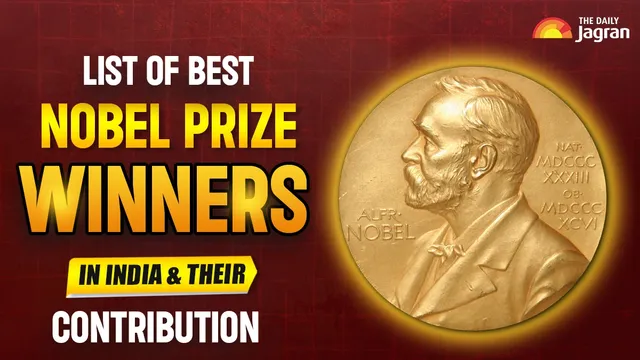- By Anshika Verma
- Fri, 08 Aug 2025 05:58 PM (IST)
- Source:JND
Nobel Prize Winners in India: The Nobel Prize is one of the most prestigious international honours or awards, granted every year to those individuals and organisations who have made remarkable contributions to humanity. This was established by the will of Alfred Nobel, the Swedish inventor, the Nobel Prize recognises outstanding and exceptional achievements that have made a significant impact on society and the economy. Here, we bring to you the list of the top Nobel Prize Winners of India as well as their outstanding contributions in the field.
The first Indian to receive the Nobel Prize was Rabindranath Tagore in the year 1913, who won the Nobel Prize in Literature for his profound literary work, Gitanjali (popularly known as the collection of poems). Since then, India has produced several remarkable Nobel Prize Laureates. In this article, we have curated the list of the Nobel Prize winners from India, their respective fields, and their excellent contribution in various sectors.From scientists and peace activists to writers and doctors, these Indian winners have changed the world and leave a lasting legacy.
Top 3 Categories of the Nobel Prize:
The Nobel Prize is awarded in the following six categories to those people who have made exceptional contributions in this field :
1. Physics
2. Chemistry
3. Medicine
4. Literature
5. Peace
6. Economic Sciences
India’s Contribution to the Nobel Prize:
India has made some of the most crucial contributions to the Nobel Prize, with various Indian laureates being honoured for their achievements and contributions in a variety of sectors. Rabindranath Tagore, a famous personality was the first Indian to receive the Nobel Prize in Literature in 1913. Since then, India has produced multiple remarkable Nobel Laureates in various fields.
Also Read: India’s Leading Colleges For Artificial Intelligence And Machine Learning In 2025
List of Nobel Prize Winners in India and Their Contributions:
Name | Year | Field | Contribution |
Rabindranath Tagore | 1913 | Literature | Gitanjali (a beautiful collection of poems) |
Sir Chandrasekhara Venkata Raman | 1930 | Physics | He discovered Raman Effect/Scattering |
Mother Teresa | 1979 | Peace | She contributed to overcome poverty |
Amartya Sen | 1998 | Economics | Contribution to Welfare Economics |
Kailash Satyarthi | 2014 | Peace | He fought for children’s rights and education |
Har Gobind Khorana | 1968 | Physiology or Medicine | Interpretation of the genetic code and its function |
Subrahmanyan Chandrasekhar | 1983 | Physics | His studies of the physical processes important to the structure and evolution of stars |
Venkatraman Ramakrishnan | 2009 | Chemistry | Studies of the structure and function of the ribosome |
Abhijit Banerjee | 2019 | Economics | His experimental approach to alleviating Poverty |
Ronald Ross | 1902 | Physiology or Medicine | Work on malaria, laying the foundation for research on this disease |
14th Dalai Lama | 1989 | Peace | Consistent resistance to violence in the struggle for liberty |
Rudyard Kipling | 1907 | Literature | Originality, observation, and talent in his works |
V. S. Naipaul | 2001 | Literature | Unified narrative and scrutiny to reveal suppressed histories |
According to an official data of 2024, the Nobel Prize has been awarded to a total of 1,012 individuals and organisations since its commencement in the year 1901. There are 976 individuals and 28 organizations who have recieved Nobel Prize for their outstanding contribution. The breakdown of individual laureates includes a total of 930 men and 59 women, reflecting a slight increase in female recipients over the years. Stay connected with us if you want to enhance your general knowledge with these type of content.

